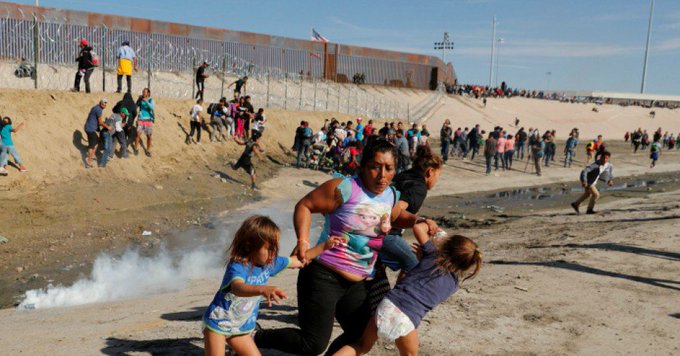“Now people say, ‘Well Frank, but how can you defend him, when he’s lived such a sordid life?'” Graham told Axios on HBO. “I never said he was the best example of the Christian faith. He defends the faith. And I appreciate that very much.”
Which raises a perfectly legitimate question: which faith is Trump defending?
This faith?
At Culberson’s post-election gathering, according to video from Houston television station KHOU, [Dr. Ed] Young [pastor of Second Baptist Church, Houston] claimed a Pittsburgh-area Democratic Party chairman had been forced out over a Facebook repost about how Americans should “kneel at the cross.”
The post actually criticized NFL players’ anthem protests, one of several that seemed more like racial insults.
But Young took it out of context, telling the Republican gathering the Democratic Party is “no longer a party. It’s some kind of religion that is basically godless, and as long as America — and this is represented by every Democrat I know — does not believe in the sacredness of the life in the mother’s womb, God will not bless America or make us a great nation.”
I noted, when I first published that:
Come to think of it, people like Ed Young don't think too much of the sacraments either, consider attendance at revivals a greater sign of personal holiness than attendance on Sunday morning, think "God helps those who help themselves" is from the book of Proverbs, and don't really care about confession or even moral responsibility, since once you're saved you've got it made, And church attendance is mostly to see who's NOT there or what condition they're in before noon on Sunday morning. So yeah, I guess Donald Trump is religious by those standards, since his politics are to the right of Atilla the Hun, and that's what really matters..
Time to expand on that a bit, because there is an argument to be had about theologies and religious practices, apart from the argument that I am right and you are wrong (not too far from it, of course, so I speak already knowing I'm violating that text about "don't judge, and you won't be judged." We'll see how well I do.)
Ed Young's theology, much as I can describe it from the outside and from decades of exposure to it in the Southern Baptist culture of my youth (in it but not of it, literally, as I grew up Presbyterian in a Southern Baptist town), is that salvation is a once and for all act that saves you from any further obligation, except to prove that you are truly "saved" and not just saying so for the social (and presumably eternal) benefits. So Baptists don't speak to each other in the liquor store, and you take two Baptists fishing with you because if you take one, they'll drink all your beer. Humor from my youth, living in a "dry" county where the Baptists sobered up for the occasions when the county's liquor sales status was up for a vote. This soteriological focus pretty much determines how everything else is done: the liturgical calendar is non-existent, except for Christmas Eve and Easter Sunday, when communion must be offered (and only a handful of times the rest of the year, 5 being the usual number.). Sunday worship is to praise God and get life lessons from the pastor, nothing too challenging because the message is either about the damned (which group you have safely avoided staying with) and the blessed (that's you, especially since you are well off and white and admired as a church member). The church calendar mostly revolves around "revivals," where fervor is increased and altar calls bring new people to salvation (like baptism, a once in a lifetime experience, although
like the medieval days of the epiclesis, some would attend revivals in different places for the pleasure of answering the altar call more than once). Soteriology is the be all and end all of Christianity for people like Ed Young, and once you have achieved that, the rest is gravy and good eatin', with a backstop against back-sliding because you really don't want people to know you're call to the altar was a wrong number.
As you can see from Dr. Young's remarks, "faith" has a great deal more to do with the right politics than it does with right living. It wasn't always thus, but it seems to be more and more that way today, at least among conservative Christians with a public soapbox. But don't take my word for it,
or the example of Young and Graham, alone.
In the BGC survey, when white evangelicals were asked to name all the factors that influenced their votes in 2016, fewer than half mentioned abortion or the Supreme Court. Their top issues were the economy, health care, national security, and immigration. The biggest gap between pro-Trump evangelicals and other evangelicals, when they were pressed to name the most important voting issue, was on immigration. That issue was more important to Trump supporters in the BGC survey, and it’s a big winner for Trump among WEPs [White Evangelical Protestants] in other polls. “White evangelicals overwhelmingly back more hardline positions on immigration, with three-fourths wanting a reduction in legal immigration,” Stetzer reports.
The enthusiasm for Trump’s hard line on immigration isn’t just about terrorism or enforcing laws. It’s about fear of immigrants per se. In the Pew Research Center’s 2014 Religious Landscape Study, non-evangelical Republicans and Republican leaners said, by a margin of 35 percentage points, that “a growing population of immigrants” was “a change for the worse,” not for the better. Among Republicans who identified themselves as evangelical or born-again, the margin rose to 48 points. In a survey taken after the 2016 election, 50 percent of white evangelicals, compared with 33 percent of white non-evangelicals, agreed that “immigrants hurt the economy.” The 2018 PRRI survey asked whether “the growing number of newcomers from other countries … strengthens American society” or “threatens traditional American customs and values.” Only one religious group said the newcomers were a threat. You guessed it: WEPs.
There is, William Saletan discerns from the statistics, a deep racism at work here:
Initially, when Stetzer diagnosed race and ethnicity as sources of the white evangelical backlash against immigration, he was talking about gaps between white and nonwhite evangelicals on poll questions that were open to interpretation. But PRRI, in its 2018 survey, proved that race and ethnicity were factors. The survey informed respondents that “by 2045, African Americans, Latinos, Asians, and other mixed racial and ethnic groups will together be a majority of the population.” Then came the query: “Do you think the likely impact of this coming demographic change will be mostly positive or mostly negative?” After listening to this question, most white Catholics and most white mainline Protestants said the change would be positive. Most WEPs said it would be negative. A PRRI/Atlantic poll taken in June found the same result.
In his warning on Election Day, Stetzer faced the bitter truth: “It is hard not to conclude that far too many white evangelicals are motivated by racial anxiety and xenophobia.”
Not that there's anything new about this. 11:00 on Sunday morning has long been the most segregated hour in America.. That may be changing as white evangelicals "age out" and younger evangelicals embrace a multi-racial, multi-cultural world, Or maybe not, who knows? Young white people seem to be the most prominent racists around just now, proving racism is still being taught and those teachers are still finding willing students, and the idea that racism in America faces demographic demise is surely more a matter of narrative than reality. 10% of American shopping is done on-line, yet the narrative about Black Friday is now about how much shopping wasn't done in stores (probably more than last years, but as an absolute percentage?). Still, the issue remains: the rabid supporters of Donald Trump who also claim a religious identity, are not easily reconciled with the core messages of Christianity. And we return to the question asked of Franklin Graham: what faith is Trump defending? And what defense does faith need, anyway?
Christian apologetics has devolved into a FoxNews level battle between Christians and atheists, with neither side being especially well versed in their subjects. It was once the province of thinkers who reshaped Western thought and culture, people like Anselm and Augustine. No one is ever going to confuse Richard Dawkins or the late Christoper Hitchens with Duns Scotus or Aquinas (who built his
Summa Theologica on Aristotle's works). The original "defense of the faith" was an effort to explain it to a Hellenistic world in terms that would be understood by the greatest minds of the day. Today it is discussed like this:
Christianity says you should love the stranger, respect families, honor your wife, and treat all people as children of God. WEPs, more than any other constituency, are choosing to ignore those values at the ballot box.
That's not wrong; and it's convenient to the argument, which is far more political than it is even ecclesiological (much less theological), but it's not exactly a deep understanding of the subject, either.
The racial divide in American Christianity is as old as the racial divide in this country.
The simple fact is, the media loves conflict. What the Catholic Bishops get up to on a daily basis is of no interest to journalists at all. When the Bishops issue a statement sure to prompt a response, to create, in other words, a secular conflict, then that is reported. Otherwise, what the Bishops do to protect their flock or serve their God, is not reported. What ordinary Christians do, as individuals and as church members, is almost never reported. What some pastor says, especially when it is about politics and promotes conflict ("they are wrong, we are right!"), gets reported. Otherwise? Crickets.
So what do we learn from stories about statistics and what public figures say about matters of the day? We learn that conflict drives narrative, and journalists love to tell stories. Franklin Graham knows if he says Trump is defending the faith it will get him some more media attention, and it will stir people like me to respond. He knows it will feed conflict, and conflict is what he thrives on. Ed Young wants conflict when he says things have not gone his way in November. I want to stir conflict because I take to my keyboard and write things like this. And what, in the name of Christ, are we doing?
Not acting in the name of Christ; that much is clear.
I have no patience and want no association with the theology of Ed Young or Franklin Graham. Their raison d'être is personal salvation; once the individual is saved, all obligations to others are off, except to live as an exemplar of the faith (faithful to your spouse, no drinking, no swearing in public, basically the Boy Scout pledge to be clean, reverent, brave, and socially upright). Your only obligation after that, possibly, is to evangelize others so they, too, are saved; but the emphasis on that varies and wanes as one becomes more prominent and important in the church (and, not coincidentally, society). Obligations to the poor show up at Christmas time, when some token gesture is made by the church as a whole, and you play a minor part, and nothing disturbs the slumber of your moral righteousness. Mostly it's about personal salvation and personal satisfaction, and "Jesus loves me, but he can't stand you." It's theology as soteriology, first and last, alpha and omega, and very little more involved. God is not transcendent, God is immanent, and that immanence is shown in the comfort in which you live, and your community lives, and your nation lives; and anything that disturbs your comfort is a sign God is not immanent enough in all the right places, and that's the fault of the people in those places; not the result of your failure to understand God's transcendence, or your responsibility to others. "Lord, when did we see you?" is answered by "Didn't we see you in our friends and our church members and our comfort?"
I think the answer to that response is already stated in Matthew 25. Then again, none of the sheep in Matthew 25 were saying "I told you so" to the goats, so I do myself no benefit to say that now.
I'm more interested in news reports about churches: when churches act like Christian institutions, when they care for the immigrant and the stranger and the poor, when they see Jesus in prison, needing food, needing clothing, needing shelter, nobody reports on that. Acts of charity and spirituality don't promote conflict, except a conflict with the narrative of the world, where giving a man a fish is weakening him, and teaching a man to fish is the highest and best good (except then why do so many college graduates today have debts that can't pay, and jobs that don't pay them? Haven't they been taught to fish?). But that's not enough of a conflict to create a story, so journalism ignores that, too. Christmas is coming, and the story will be about conflict again: the turnout for shopping v. previous years; the amount of money spent on-line v. at physical stores; the clashes in stores to get the sales items before they run out of supply (funny, no stories like that gained national attention this Black Friday). The conflict between Christmas as a season for charity and mercy, v. the mercantile vision of Scrooge keeping as many coins in the till as he can gather ("A poor excuse for picking a man's pocket every 25th of December!"). I don't want to fight that old, old war on Christmas anymore; I've made my peace with it.
What I need to do now is make my peace with the people constantly presented to me as Christians and Christian leaders, when I don't recognize them as either. I struggled with this post, trying to get it to this point without knowing clearly what point I wanted to reach, and without being able to make a start at getting there. I finally settled on a rough draft, with this portion attached to that portion. If it changes theme or thesis or direction abruptly to end here, that's not an accident or a mistake. I don't think these two things fit together, in the end, except as a sort of confession, a laying out of data which finally forces the reasoning to break through. Much as he tries not to, Saletan lumps too many people together in groups too small to be more than rhetorically convenient; it is a reductio argument far too common in this age of reliance on polls based on what Walt Kelly wisely described as "the buckshot use of the curved question." That problem infects most of our public discussions. I keep trying to find a way to clean that up and find a new position, a different narrative, another way of thinking about it all. I keep failing, mostly because I keep relying on the same internet sources for my springboard.
Maybe this time I can finally treat Advent as the "little Lent" it was meant to be, and truly clear away the undergrowth and prepare the way of the Lord; in my soul, if nowhere else. Or I can just be grandiose while preaching my own humility.
I think I'll do something within reach, and try to drop politics for a month in favor of preparing the way for the Christchild. That's what Advent should be about, anyway; and it could be a fruitful spiritual practice to try it as fiercely as I can.
/cdn.vox-cdn.com/uploads/chorus_image/image/60975031/1020991570.jpg.0.jpg)








